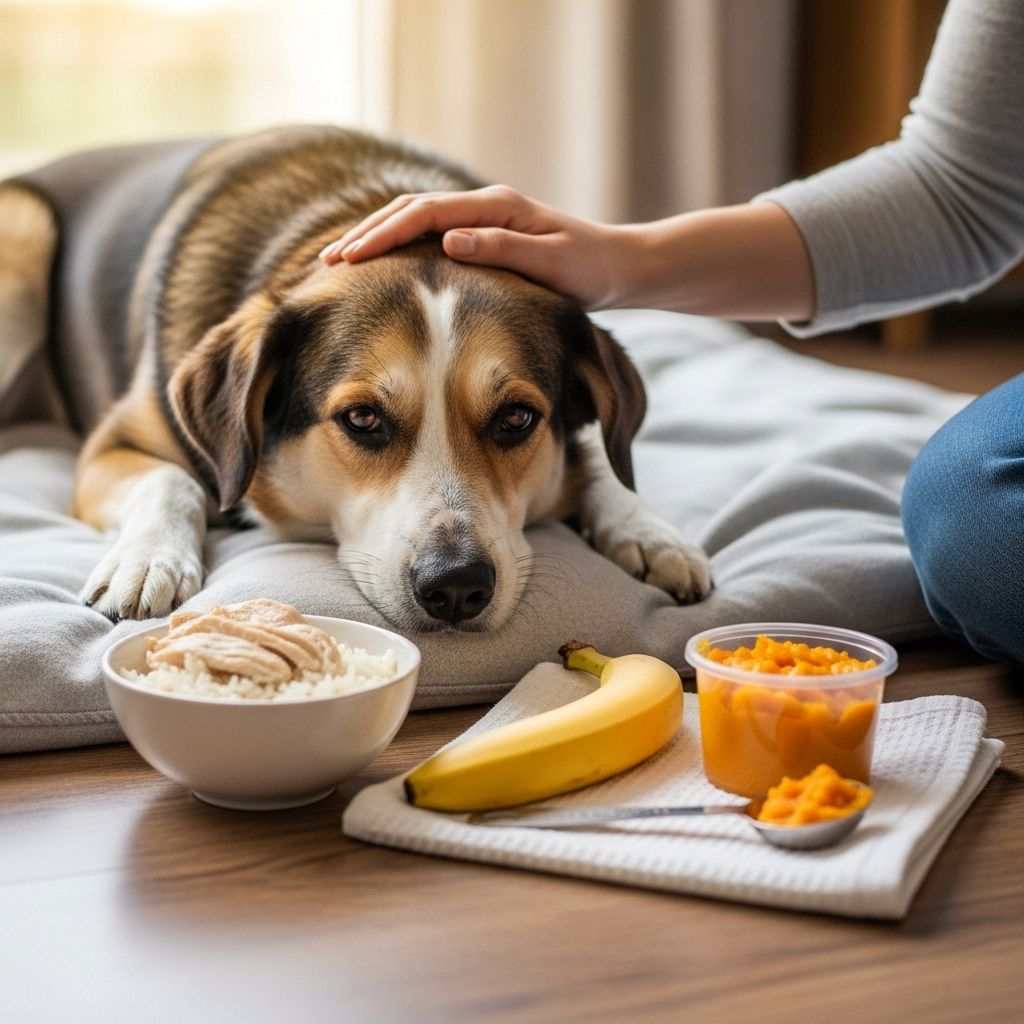Effective Home Remedies for Dog Diarrhea: A Comprehensive Guide
Learn gentle home remedies to treat your dog's diarrhea, help soothe digestive upset, and support a quick healthy recovery.

Diarrhea is one of the most common health issues faced by dogs, affecting pets of every age and breed. While it can be distressing to watch your canine companion struggle with digestive upset, many mild cases can be safely managed at home. However, it is important to understand when a home remedy is appropriate versus when professional veterinary care is needed. This comprehensive guide will walk you through the most effective home remedies, explain underlying causes, provide practical tips for care, and address common questions about dog diarrhea.
Understanding Dog Diarrhea
Diarrhea refers to frequent, loose, or watery bowel movements. It can result from a variety of causes, ranging from simple dietary indiscretion to infectious diseases or chronic medical conditions. Recognizing the likely cause of your dog’s diarrhea is crucial for effective management and for determining whether a home remedy is suitable.
- Acute Diarrhea: Sudden onset, often self-limiting, and commonly caused by dietary indiscretion, mild infections, or stress.
- Chronic Diarrhea: Lasts longer than two weeks and may indicate a more serious underlying issue, such as allergies, parasites, or digestive disorders.
Common Causes of Diarrhea in Dogs
- Dietary changes or indiscretion (eating garbage, table scraps, or spoiled food)
- Stress or anxiety (moving, boarding, new pets)
- Food intolerance or allergies
- Intestinal parasites (worms, protozoa)
- Bacterial or viral infections
- Medications such as antibiotics
- Chronic disease (IBD, pancreatitis)
Identifying the trigger can help you choose the best at-home remedies and avoid repeated episodes in the future.
Signs That Require Immediate Veterinary Attention
While many cases of mild diarrhea resolve with simple home care, some symptoms indicate an urgent need for veterinary evaluation. Call your veterinarian immediately if your dog:
- Is lethargic, depressed, or extremely weak
- Has blood in the stool (bright red or dark/black)
- Is vomiting repeatedly or cannot keep water down
- Shows signs of dehydration (dry gums, sunken eyes, skin tenting)
- Is a puppy, senior, or has underlying chronic conditions
- Has diarrhea that persists more than 48 hours despite home remedies
In these circumstances, home care is not appropriate and prompt veterinary intervention is needed to prevent complications.
Top Home Remedies for Dog Diarrhea
1. Withholding Food (Fasting)
Temporarily withholding food for 12–24 hours allows your dog’s digestive tract to rest and reset. This can be effective in clearing minor stomach upsets, especially after dietary indiscretion.
- Adult, healthy dogs: A short fast is considered safe. Always provide access to clean, fresh water.
- Never fast: Puppies, elderly dogs, small breeds, pregnant/lactating females, or dogs with chronic illnesses. These dogs are more vulnerable to hypoglycemia and dehydration.
2. Bland Diet: Chicken and Rice
A bland diet is the most common and widely recommended remedy following a fast. It helps soothe the digestive tract and provides easy-to-digest nutrition.
- Boiled, skinless chicken breast (or turkey) and plain white rice, mixed in a ratio of 2 parts chicken to 1 part rice.
- Serve small portions (1–2 tablespoons for large dogs, 1 teaspoon for small dogs) every few hours.
Gradually increase the amount if tolerated without further diarrhea. - Feed for 2–3 days until the stool returns to normal, then slowly reintroduce regular dog food over another few days.
- Avoid: Seasonings, salt, oils, butter, and any additives.
3. Plain Canned Pumpkin
100% plain canned pumpkin (not pie filling) is rich in dietary fiber, which helps absorb excess water in the intestinal tract and bulk up stools.
- Small dogs: 1 teaspoon per meal
- Medium to large dogs: 1–3 tablespoons per meal
- Offer with meals for several days or until stool firms up.
4. Probiotics and Plain Yogurt
Probiotics are beneficial bacteria that support gastrointestinal health and restore the intestinal flora disrupted by diarrhea. These can be administered as supplements or through small amounts of plain, unsweetened yogurt containing live cultures.
- Dogs that tolerate dairy: Greek yogurt (plain, unflavored) – 1 teaspoon for small dogs, 1 tablespoon for large dogs.
- Probiotic supplements: Available from pet supply stores or veterinarians; choose a product formulated specifically for dogs.
5. Bone Broth and Hydration
Maintaining hydration is crucial since diarrhea leads to fluid loss. Bone broth is gentle, nourishing, and can entice your dog to drink more.
- Homemade: Simmer bones (without onions, garlic, or salt) in water for several hours, strain, and offer the cooled liquid. Remove all bones and fat before serving.
- Commercial bone broth: Use only unsalted, pet-safe products without added seasonings.
- You can also add a small amount of low-sodium chicken broth to water to encourage drinking.
6. Rice Water
Rice water is a clear liquid derived from boiling rice, which can help bind stool and soothe your dog’s stomach. To make rice water:
- Boil 1 cup of white rice in 4 cups of water for 20 minutes.
- Strain out the rice, and let the resulting milky liquid cool.
- Offer in small amounts several times a day.
7. Psyllium Husk (Fiber Supplement)
Psyllium husk (available as Metamucil) absorbs water and helps bulk up the stool.
- Use plain, unsweetened psyllium powder.
- Dosage:
- Dogs under 25 lbs: 1/4 teaspoon twice daily
- Dogs 25–50 lbs: 1/2 teaspoon twice daily
- Dogs over 50 lbs: 1 teaspoon twice daily
How to Transition Back to a Normal Diet
To avoid recurrence, gradually reintroduce your dog’s regular diet over several days:
- Mix increasing amounts of regular dog food with the bland diet over 3–4 days.
- Monitor stool quality closely during this transition.
Natural Remedies: Additional Tips
- Slippery elm powder: Herbal supplement that can help calm the digestive tract.
- Ginger: May soothe mild nausea and upset stomach (consult veterinarian first).
- Do not give OTC anti-diarrheal medications unless prescribed by a vet: Many are unsafe for dogs and could worsen their condition.
Benefits of Home Treatment
- Safe, gentle, and non-toxic: Most home remedies use natural ingredients and avoid harsh chemical side effects.
- Readily available: Can often be made using ingredients that are already in your kitchen.
- Cost-effective: Home care is much less expensive than emergency veterinary visits or prescription drugs for mild cases.
- Reduces stress: Managing symptoms at home can minimize anxiety and discomfort for both you and your dog.
When Home Remedies Are NOT Enough
If diarrhea:
- Persists beyond 48–72 hours
- Is accompanied by vomiting, blood, or signs of severe illness
- Is experienced by puppies, frail, or immunocompromised dogs
Contact your veterinarian for further diagnosis and treatment. Chronic or severe cases may require fecal testing, bloodwork, imaging, or prescription medications.
Preventing Diarrhea in Dogs
- Keep your dog on a consistent, high-quality diet.
- Avoid giving table scraps or fatty, spicy foods.
- Ensure timely deworming and vaccinations as recommended by your vet.
- Nurture a healthy gut with probiotic-rich foods and supplements.
- Avoid sudden changes in food, and always transition diets gradually over a week.
Sample Feeding Schedule for Soothing a Dog’s Upset Stomach
| Time | Food Item | Portion Example |
|---|---|---|
| Morning (after fast) | Boiled chicken & rice | 1–2 tbsp (large dog) / 1 tsp (small dog) |
| Midday | Chicken & rice with pumpkin | Above, with 1 tbsp (L) or 1 tsp (S) pumpkin |
| Evening | Rice water or bone broth | 1/4 cup (L) / 2–3 tbsp (S) |
Frequently Asked Questions (FAQs)
Is it safe to fast my dog when they have diarrhea?
Fasting for 12–24 hours is safe for healthy adult dogs and gives the digestive tract time to rest. However, avoid fasting puppies, elderly dogs, or those with chronic diseases, as they risk developing low blood sugar and dehydration.
Can I use over-the-counter or human anti-diarrheal medications?
No. Most human anti-diarrheal drugs are unsafe for dogs and may be toxic. Always consult your veterinarian before giving any medications not specifically prescribed for canines.
How much plain pumpkin should I give my dog?
Feed 1 teaspoon for small dogs and up to 1–3 tablespoons for large dogs, mixed with meals until the diarrhea resolves.
When should I take my dog to the vet?
If diarrhea lasts more than 48 hours, is accompanied by vomiting or blood, or if your dog is lethargic, showing signs of dehydration, or is very young, old, or has pre-existing health concerns, seek veterinary care promptly.
Is yogurt good for dogs with diarrhea?
Plain Greek yogurt containing live cultures can help some dogs by restoring beneficial gut bacteria. Ensure your dog is not lactose intolerant and give only small portions as a supplement to the bland diet.
Are any foods particularly dangerous for dogs with diarrhea?
Avoid fatty, spicy, or sugary foods, as well as bones, onions, garlic, and artificial sweeteners. Plain, simple, and bland foods are safest during recovery.
What can I do to prevent diarrhea in my dog?
- Stick to a regular feeding schedule with high-quality food.
- Prevent access to garbage, spoiled food, or toxic substances.
- Maintain good hygiene, practice regular deworming, and keep vaccinations up to date.
Conclusion
Most mild cases of dog diarrhea can be safely managed at home with careful fasting, bland diets, pumpkin, and probiotic support. However, always monitor for signs of dehydration, blood, or systemic illness, and consult your veterinarian when in doubt. With a caring approach and the right remedies, you can help your furry friend return to their playful, healthy self in no time.
References
- https://www.supremesourcepet.com/blogs/news/home-remedies-for-dog-diarrhea
- https://franklintnvet.com/4-effective-home-remedies-for-dog-diarrhea/
- https://www.thefarmersdog.com/digest/what-to-give-dogs-for-diarrhea/
- https://www.dogsnaturallymagazine.com/stop-dog-diarrhea/
- https://vcahospitals.com/shop/articles/8-home-remedies-for-diarrhea-and-2-that-are-dangerous-for-your-pet
- https://www.petmd.com/dog/general-health/home-remedies-for-dogs
- https://honnasvet.com/dog-diarrhea-and-vomiting-home-treatment/
- https://www.vet.cornell.edu/departments-centers-and-institutes/riney-canine-health-center/canine-health-information/diarrhea
- https://www.youtube.com/shorts/fwNV7tCUhqw
- https://www.drharveys.com/blog/post/187-home-remedies-for-diarrhea-in-dogs-help-your-furry-friend-feel-better
Read full bio of medha deb












